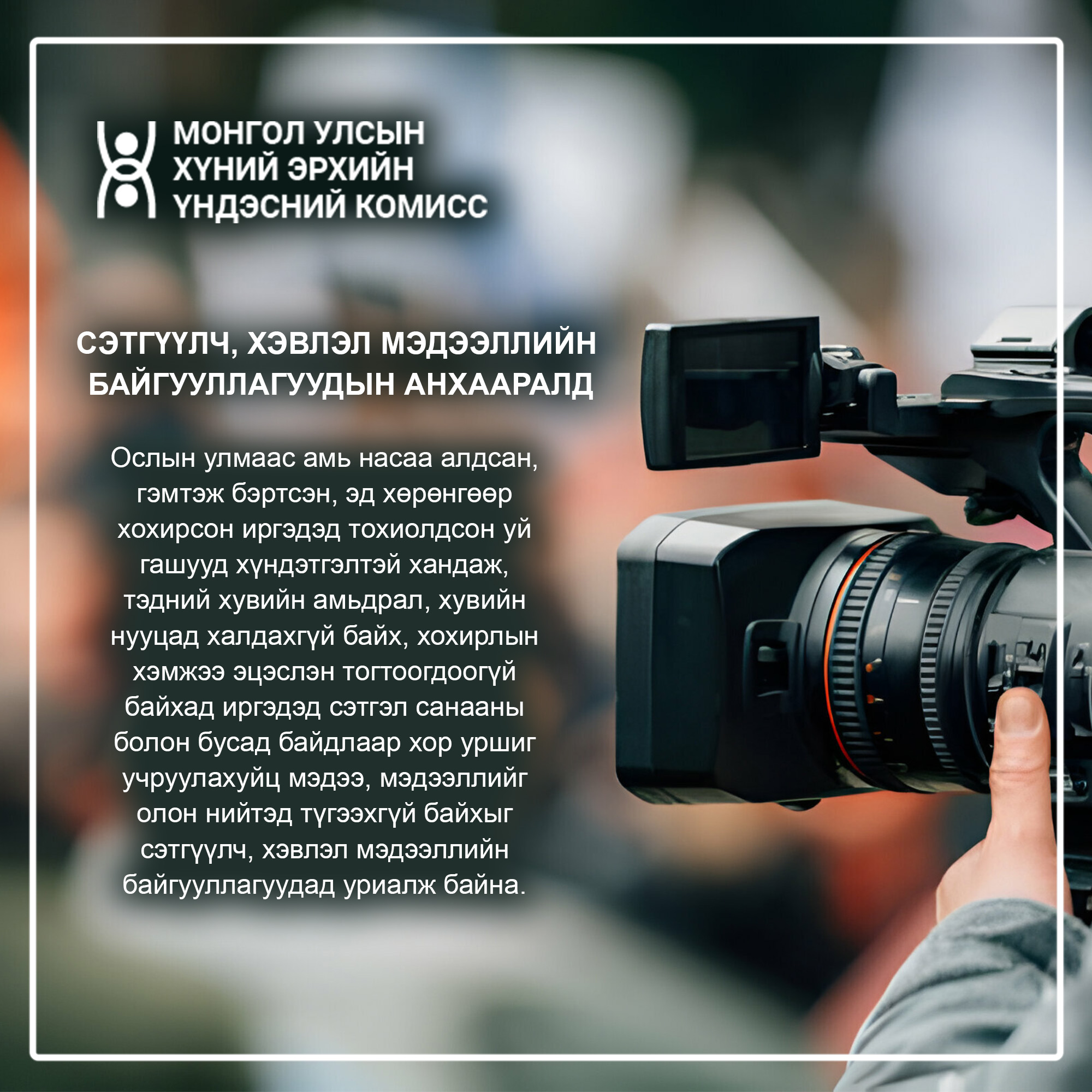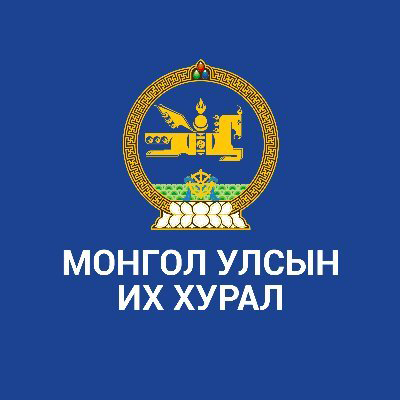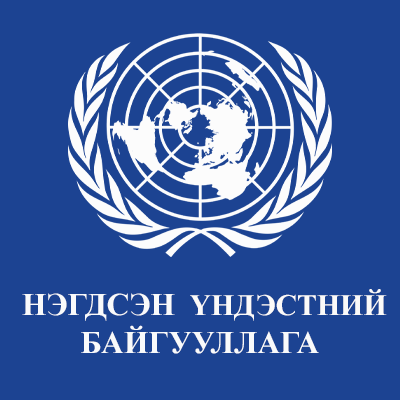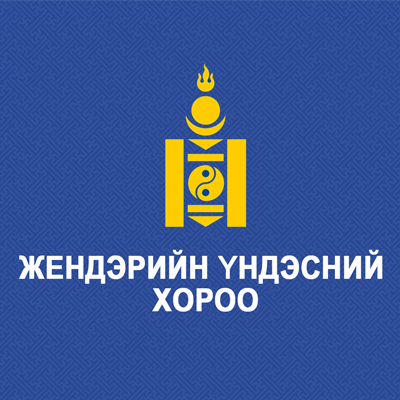NATIONAL HUMAN RIGHTS INSTITUTION
The legal principles of national institutions for the promotion and protection of human rights, or "Paris principles", developed from expert consultations organized by the United Nations in 1991, were approved by the UN General Assembly Resolution No. 1993/48/134, established the minimum standards of authority, activity, and legal status of national institutions for the promotion and protection of human rights.
The World Conference on Human Rights held in Vienna in 1993 urged state parties to establish national institutions of human rights that provide, protect, and promote human rights, freedom, justice, and unity that are stipulated in international agreements and conventions by Paris principles.
The national human rights institution should be independent, given a broad mandate, the continuously operation, the composition should be the pluralist representation of the social strata, accessible, and have adequate resources.
The main principles of the NHRIs are the rule of law, autonomy, independence, transparency, impartiality, steadfast protection of human rights, freedom, and justice.
NATIONAL HUMAN RIGHTS COMMISSION OF MONGOLIA
The National Human Rights Commission of Mongolia is a national institution that is independent and mandated to protect, promote, and oversee the implementation of human rights and freedoms guaranteed by Mongolia's Constitution, laws, and international treaties.
A national human rights institution was established in Mongolia by the Parliament adopting the Law on the National Human Rights Commission of Mongolia on 7 December 2000 and appointing the first commissioners S.Tserendorj, G.Dalaijamts and J.Dashdorj.
On 23 January 2020, the Parliament adopted the revised Law on the National Human Rights Commission of Mongolia, which introduced significant changes to the Commission’s mandate, and the number of commissioners increased to seven.
INTERNATIONAL MEMBERSHIP
The National Human Rights Commission is an independent institution that complies fully with the Paris Principles. In 2003, it became a full member of the Global Alliance of the National Human Rights Institutions with voting rights; in 2003, it became a full member of the Asia-Pacific Forum of the National Human Rights Institutions; and in 2018, became a member of the Eurasian Ombudsmen Alliance.
The Commission has the right to submit parallel information on human rights issues to the UN Human Rights Council and Human Rights Treaty Bodies and participate in meetings independently.
The Sub-Committee on Accreditation of the Global Alliance of National Human Rights Institutions accredited the National Human Rights Commission of Mongolia with “A” status in 2003, 2008, 2014, and 2021.
The National Human Rights Commission of Mongolia chaired the Asia-Pacific Forum of the National Human Rights Institutions in 2015-2018. Khunan Jargalsaikhan, Chief Commissioner, was elected Deputy Chairperson of the Asia-Pacific Forum of the National Human Rights Institutions in 2022.
SYMBOL
The symbol of the National Human Rights Commission is a wreath of two people with arms raised up and down. This image expresses the idea that “The people of our planet will enjoy the rights that should be enjoyed equally regardless of whether they are above or below, rich or poor, child or adult”.
MISSION
Shall lead the creation and development of a society where every person lives with freedom and equal rights by respecting, protecting, and promoting human rights and freedom through disseminating the human rights culture.
OPERATIONAL STRATEGIC GOALS AND PRIORITIES
The Commission adheres to principles of respect for human rights and freedom, accessibility, fairness, and being transparent, autonomous, and independent.
FUNCTIONS
The Commission operates the following functions under the Law on National Human Rights Commission of Mongolia and other laws and regulations. It includes:
• Deliver proposals and recommendations related to human rights and freedom in Mongolia to competent organizations, officials, and legal entities;
• Deliver proposals on whether drafts of laws or administrative decisions are in conformity with the Constitution, international treaties, and human rights principles;
• Deliver proposals to accede and ratify international human rights treaties and submit reports to the UN Human Rights Council and human rights treaty bodies;
• Submit proposals about improving the legislation connected with fulfilling human rights and freedoms to the officials or authorities with a right to initiate legislation;
• Promote and disseminate human rights education;
• Protect human rights and freedoms;
• Cooperate with governmental, civil society, and media organizations, legal entities, and international organizations;
• Commissions studies on requisite issues by academic and research institutions and non-governmental organizations and appoint thematic experts for conclusions;
• Implement national activities to prevent torture and other forms of cruel and inhuman punishment or degrading human dignity and submit reports to the State Great Khural/Parliament;
• Oversee the implementation of the Law on Ensuring Gender Equality
• Oversee the implementation of the Law on Protection of Personal Data
• Oversee the implementation of the duty to ensure, protect, and respect human rights and freedoms of government institutions and officials in par with its mandate;
• Prepare the annual Status Report on Human Rights and Freedoms in Mongolia and submit it to the State Great Hural;
• Implement the functions stipulated in the Law on the Legal Status of Human Rights Defenders.
CHIEF COMMISSIONER AND COMMISSIONERS OF THE NATIONAL HUMAN RIGHTS COMMISSION
The National Human Rights Commission of Mongolia comprises seven commissioners and the commissioner’s mandate shall begin with an appointment by the parliament for a term of six years and end with the newly appointed commissioner. The commissioner can be re-appointed once.
The Chief Commissioner shall be appointed once for a term of six years from among Commissioners by the State Great Hural, based on the proposal by the Speaker of the State Great Hural. During the absence of the Chief Commissioner, the commissioner who has been in the office for the most extended duration, if several commissioners fulfill the requirement, the eldest commissioner shall perform the duties of the Chief Commissioner.
MEETING OF THE COMMISSIONERS
A meeting, a primary decision-making form of the Commission, convenes monthly. An ad-hoc meeting may convene on the initiative of the Chief Commissioner when necessary. The Commission sets the order of the meeting itself, and the following issues related to functions are discussed and resolved at the meeting.
· Adopt the basic rule of the Secretariat of the Commission, approve a number of the job positions and payroll within the budget approved by the Parliament;
· Discuss and approve the structure and content of the Status Report on Human Rights and Freedoms in Mongolia and the proposal of the comments and recommendations that would be delivered through the report;
· Discuss comments and recommendations on any human rights and freedoms-related issues in Mongolia that would be delivered to the competent organization and officials;
· Determine the Commission’s strategic planning and annual, quarterly, and monthly planning of the operations;
· Discuss results of the inquiries and research;
· Determine the Commission’s unified standing on human rights issues.
POWER OF THE CHIEF COMMISSIONER
· Represents Commission on domestic and foreign relations;
· Participates in the Parliament’s plenary meetings at the request of the Speaker of the Parliament;
· Participates in the Cabinet meetings of the government, matters on human rights issues in the capacity of the adviser at the request of the Prime Minister;
· Apportions complaints and information to commissioners for resolving;
· Appoints and dismisses the Director of Secretariat;
· Deals with the Commission’s internal matters;
· Adopts and enforces Commission’s internal regulations;
· Schedules and chairs the Commission’s meetings;
· Adopts Commission’s regulation on receiving and responding to complaints and information by email and telephone;
· Adopts Commission’s regulation on mediation, and;
· Facilitates activities of the Commissioner in Charge of Prevention of Torture.
POWER OF THE COMMISSIONERS
· Conduct inquiries at their initiatives based on complaints and information about violations of human rights and freedoms or by the request of citizens, organizations, public officials, and legal entities;
· Acquaint, get a photocopy, and obtain necessary information, and study from government institutions, and public officials to research human rights issues;
· Provide advice on human rights issues, and;
· Conduct inquiries following information regarding human rights violations.
THE STATUS REPORT ON THE STATE OF HUMAN RIGHTS AND FREEDOM IN MONGOLIA
The Commission annually submits to the Parliament the Report on the Situation of Human Rights and Freedoms in Mongolia within the first quarter of every year. The State Great Hural discusses the Commission’s report in regular spring plenary sessions and adopts a resolution for implementing proposals and recommendations stated in the report.
COMMISSIONER’S DIRECTIVE AND RECOMMENDATION
When a commissioner considers an organization, official, or legal entity violated human rights and freedoms, the commissioner issues a directive for reparation. When the commissioner considers the decisions of the organizations, officials, and legal entities that may violate human rights and freedoms, the commissioner issues recommendations to eliminate the causes and conditions. The directives and recommendations are compulsory.
Organizations, officials, and legal entities that have received directives and recommendations from the Commissioners are obliged to comply. When organizations, officials, and legal entities fail to take measures following directives or recommendations, the Commissioner may request competent authorities or officials to dismiss or demote public officials, cancel or suspend a legal entity's license until measures have been taken, or suspend operations.
RECEIVING, REVIEWING, AND RESOLVING COMPLAINTS
AND INFORMATION
Citizens of Mongolia, either individually or in a group, shall have a right to lodge complaints or submit information to the Commission in case of violations of human rights and freedoms that are guaranteed in the Constitution and laws of Mongolia and international treaties, and if not stipulated other than national legislation and international treaties, the foreign nationals, stateless persons have a right to lodge complaints and information like the same manner of Mongolian citizen.
A child or person who lacks partial, or some legal capacities may complain or submit information on any matters about them independently or through their legal representative, parents, guardian, and trustee to the Commission.
In the Law on the National Human Rights Commission of Mongolia, articles 21 to 26, specifically stipulate a form of complaint and information, requirements for them, duration of the inquiry, and the Commissioner’s power in inquiring and resolving complaints and information.
NATIONAL MECHANISM FOR PREVENTION OF TORTURE
According to the Law on National Human Rights Commission of Mongolia, the Commissioner in Charge of the Prevention of Torture exercises functions for preventing torture in the territory of Mongolia and carries out the following functions.
· Conduct regular inquiries in order to investigate the causes and conditions of the system where human rights and freedoms may be restricted in any form, or torture may occur in all places where a person cannot leave at his own will;
· Describe the harmful effects of torture to the public and raise awareness on the right to be free from torture to public officers and citizens;
· Conduct research on the mechanism for prevention of torture, developing books, training, promotional materials, training programs, and manuals, involving non-profit legal entities, and;
· Engages regularly with media on the prevention of torture.
The Commissioner shall submit and publish the Report of the Prevention of Torture to the Standing Committee of Legal Affairs of the State Great Hural within the first quarter of every year.
SYSTEM FOR THE PROTECTION OF HUMAN RIGHTS DEFENDER
Mongolia became the first country in Asia to set up a mechanism for the protection of human rights defenders with the passage of the Law on the Legal Status of Human Rights Defenders by The State Great Hural in 2021.
Under the National Human Rights Commission of Mongolia, there shall be a non-full-time Human Rights Defenders Committee with a mandate to issue a conclusion on whether the rights of human rights defenders have been violated. The Committee consists of six members besides its chairperson. The Commissioner in Charge of Human Rights Defenders chairs the Committee.
The Committee of Human Rights Defenders independently performs the following functions.
· Receiving complaints and information about violations of the rights of human rights defenders;
· Collect evidence, facts, and information about complaints and information;
· Determine the need to protect human rights defenders, and assess the level of danger and risk faced by human rights defenders and their family members, guardians, co-habitants, other people, and legal representatives;
· Submit the conclusions based on the risk assessment to the Commission;
· Monitoring and researching the implementation of the Law on the Legal Status of Human Rights Defenders and the situation of human rights defenders, and including it in the annual report on the state of human rights and freedom in Mongolia;
· Create a database of complaints and information.
PERSONAL DATA PROTECTION PROCEDURE
The State Great Hural adopted the Law on Personal Data Protection in 2021, which regulates relations with collecting, processing, using, and protecting personal data.
The commissioner in charge of personal data protection provides a recommendation to the data controllers for preventing violations of human rights and freedoms to collecting, processing, and using sensitive personal data, and in addition, oversees concerns about the placement and use of audio, video, and audiovisual equipment and receives, inquiries, and resolves complaints about data controllers’ procedure of collecting and using of personal data.
CIVIL SOCIETY BOARD
A Civil Society Council with 19 members consisting of non-profit legal entities, academic institutions, university teachers, and researchers in the field of human rights supports the functions of the Commission. The functions of the Civil Society Board are managed by the rules of the Civil Society Board and chaired by the Commissioner.
MISSION
Shall lead the creation and development of a society where every person lives with freedom and equal rights by respecting, protecting, and promoting human rights and freedom through disseminating the human rights culture.
OPERATIONAL STRATEGIC GOALS AND PRIORITIES
VISION
Contribute to strengthening Mongolia's system of respect, protection, promotion, and reparation of infringed rights.
LEADING PRIORITY
Strengthening people-centered social development by improving the effectiveness of the implementation of social, economic, and cultural rights is the priority of the Commission.
STRATEGICAL GOALS
Strategic goal 1: Contribute to the compliance of laws, regulations, policies, and decisions of Mongolia with the principles and norms of human rights;
Strategic goal 2: Effectively monitor the implementation of human rights and freedoms and make substantial and positive changes;
Strategic goal 3: Take the lead in strengthening the national human rights protection system;
Strategic goal 4: Strengthen the national system of human rights culture and education;
Strategic goal 5: Development of multilateral cooperation in the field of human rights;
Strategic goal 6: Strengthen the capacity of the National Human Rights Commission.
FUNCTIONS
The Commission exercises the following functions under the Law on National Human Rights Commission of Mongolia, the Law on Ensuring Gender Equality, the Law on the Legal Status of Human Rights Defenders, and the Law on the Protection of Personal Information.
• Deliver proposals and recommendations related to human rights and freedom in Mongolia to competent organizations, officials, and legal entities;
• Deliver proposals on whether drafts of laws or administrative decisions are in conformity with the Constitution, international treaties, and human rights principles;
• Deliver proposals to accede and ratify international human rights treaties and submit reports to the UNHRC and human rights treaty bodies;
• Submit proposals about improving the legislation connected with fulfilling human rights and freedoms to the officials or authorities with a right to initiate legislation;
• Promote and disseminate human rights education;
• Protect human rights and freedoms;
• Cooperate with governmental, civil society, and media organizations, legal entities, and international organizations;
• Commission studies on requisite issues by academic and research institutions and NGOs and appoint thematic experts for conclusions;
• Oversee the implementation of the Law on Ensuring Gender Equality, prepare a report, and submit it to the Parliament;
• Oversee the implementation of the Law on Protection of Personal Data, prepare a report, and submit it to the Parliament;
• Oversee the implementation of the duty to ensure, protect, and respect human rights and freedoms of government institutions and officials in par with its mandate;
• Prepare the annual Status Report on Human Rights and Freedoms in Mongolia and submit it to the Parliament within the year's first quarter.







